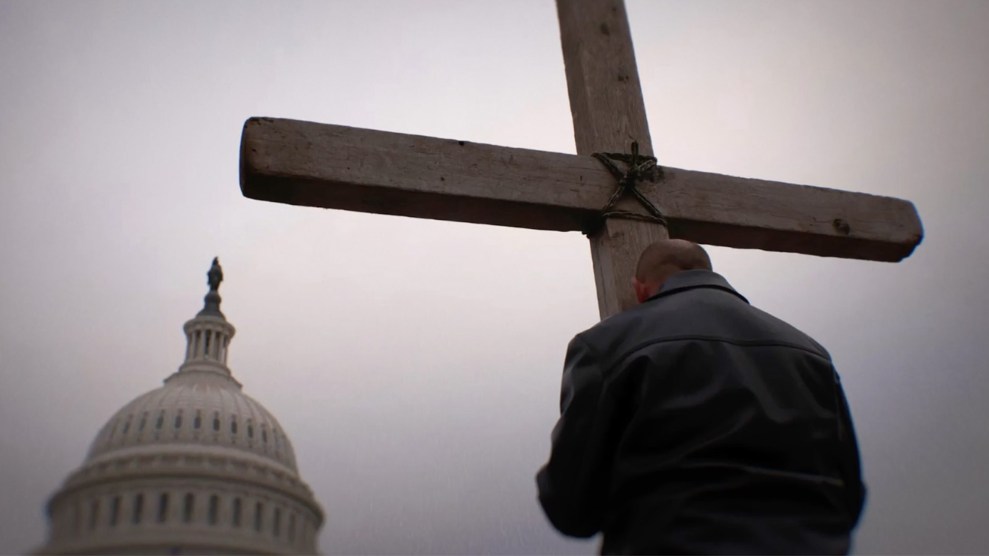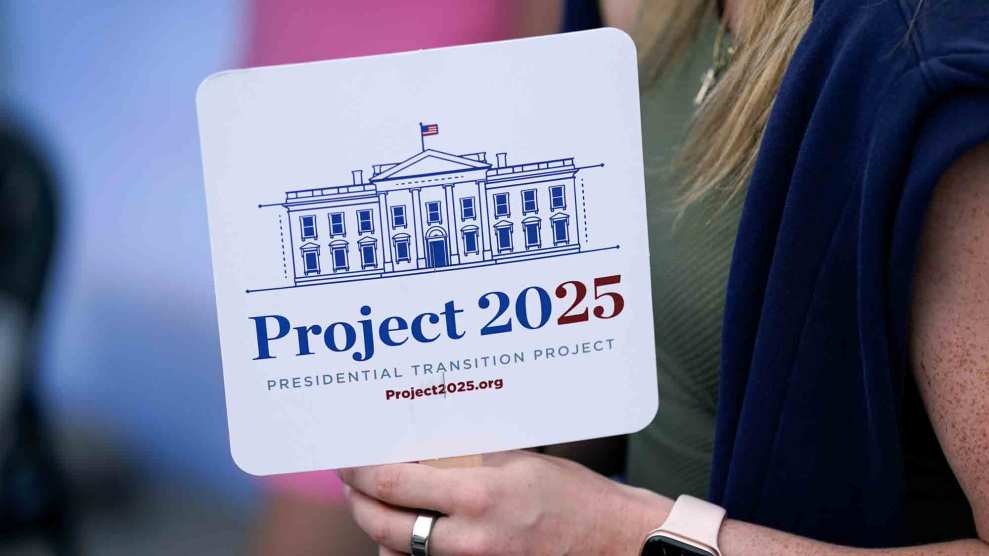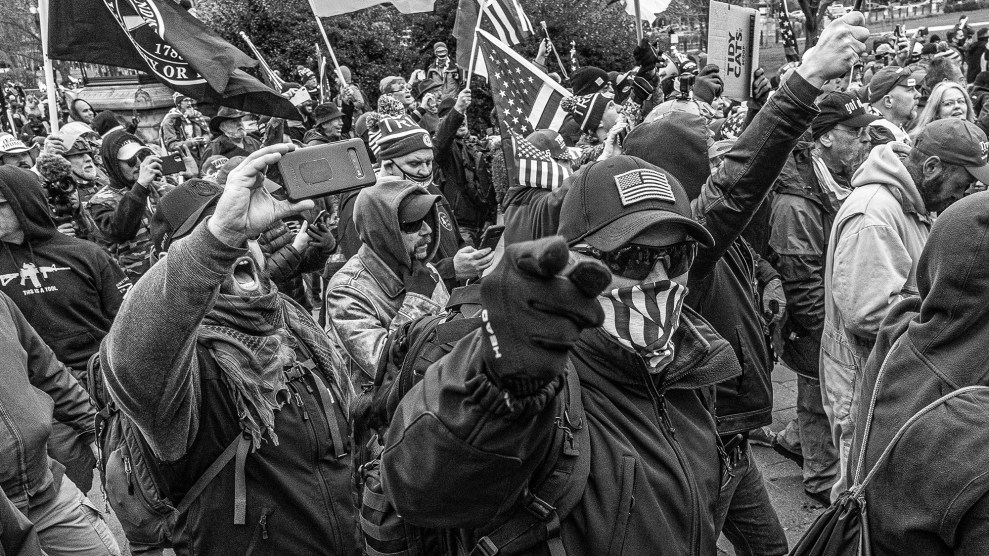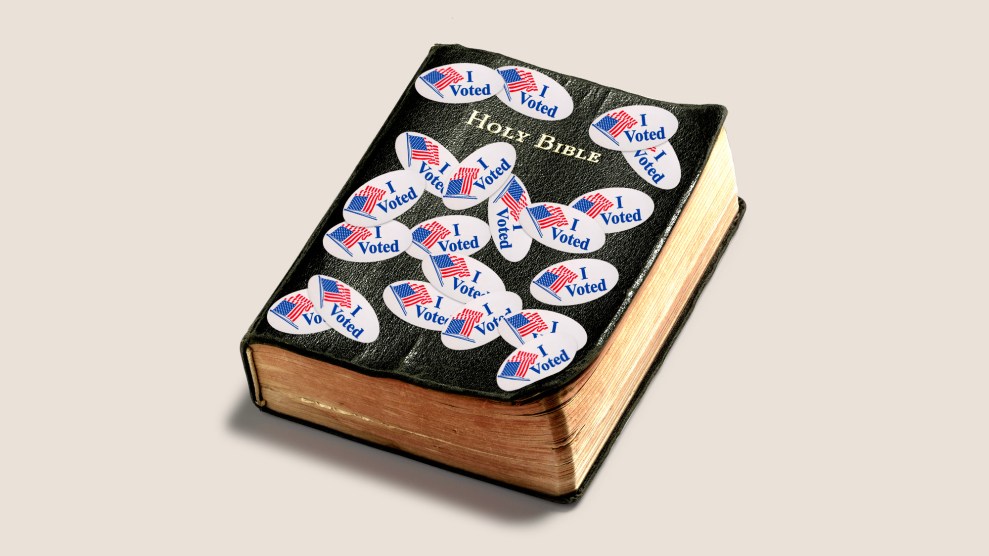
Win McNamee/Getty
The new documentary Bad Faith, directed by Stephen Ujlaki and Christopher Jacob Jones, begins with footage familiar to many Americans: an army of insurrectionists adorned in stars, stripes, and military gear storming the Capitol to stop the certification of the 2020 election results. It was a watershed moment that left many Americans wondering how we got here. Bad Faith seeks to help answer that question by looking at a crucial reason why American democracy ended up at a precipice: the rise of Christian nationalism.
Christian nationalism, broadly speaking, is a movement that believes America is a Christian nation, and that our political institutions should be governed by Christian values. But as the film points out, the movement often privileges a very narrow definition of “Christian values”: “The big idea of Christian nationalism is that God made America for Christians, and not all Christians, but a particular kind of white Christian with a particular theology and a particular worldview,” Eboo Patel, founder of the nonprofit group Interfaith America, says in the documentary.
Bad Faith contends that the story of January 6 began in the 1980s with conservative operative Paul Weyrich, who partnered with Jerry Falwell to found the Moral Majority. The organization registered and briefed conservative voters on political issues, crystallizing the religious right into a powerful voting bloc. Weyrich would also go on to co-found organizations like the Heritage Foundation, the American Legislative Exchange Council, and the Council for National Policy, forming the foundation for a sophisticated conservative network that has brought extremist, anti-democratic ideas into the mainstream. Weyrich is also credited with popularizing the pro-life stance among evangelicals, working to bring teachings about abortion into churches and thereby galvanizing evangelicals around the issue.
The documentary shows how Weyrich used anxieties about desegregation, especially in Christian colleges, to launch a network of think tanks and conferences dedicated to shaping America along ultra-conservative, Christian ideals. Though Weyrich died in 2008, his legacy is still visible in the modern right. The film cites a 2001 manifesto written by Weyrich’s mentee Eric Heubeck at the Free Congress Foundation, a conservative think tank Weyrich founded. Heubeck writes that to revive the “defeatist” conservative movement, “we will not try to reform institutions. We only intend to weaken them, and eventually destroy them.”
As we approach the 2024 election, Christian nationalism has become more mainstream in American politics than ever. The Heritage Foundation is now leading the charge on Project 2025, a plan to pack a second Trump administration with loyalists and rearrange American bureaucracy to give the president unprecedented power—a blueprint that, the filmmakers argue, shares the anti-democratic overtones of Heubeck’s manifesto. To better understand the threat of Christian nationalism and its origins, I spoke with Ujlaki and Anne Nelson, whose book on the collapse of local journalism and the rise of the right wing’s information war, Shadow Network: Media, Money, and the Secret Hub of the Alt-Right, helped inspire the film. Our interview has been edited and condensed for clarity.
What inspired you to make this film?
Ujlaki: I was inspired by the election of Trump in 2016. In 2018, I started researching. And I wanted to find out more about evangelicals because that was a key part of what brought [Trump] to power. And I went back into history to discover the roots of it. Eventually, I ran across Anne’s book, which provided a whole new dimension to the story of Christian nationalism. She delved into how they were funded, how they were organized. And she highlighted the exploits of Paul Weyrich, somebody who had pretty much avoided the spotlight for a while.
It took years to get this thing right, because the country kept shifting at the same time. So it was hard; the goalposts were changing. But Anne was great as a creative collaborator, not just her book, which was essential, but her own continuing knowledge of the situation was very helpful.
Nelson: I am from Oklahoma, and I go back several times a year to visit my family. That served as an early warning system for this movement. Oklahoma is serving as this laboratory state where they’re experimenting with legislation. They’re attacking public schools, attacking public health programs, and seeing what they can achieve with the combination of the legislature and the governor, and the judiciary then leveraging that across state lines.
Initially I thought it was just a local phenomenon. And then when I looked especially at the radio network, and the media system, [the influence] went across the middle of the United States, but not so much on the coasts. So then, when Trump’s victory occurred in 2016, I could see that there was this underlying architecture, and I jumped in to try to really map that architecture.
What did you learn about Christian nationalism by making the film?
Ujlaki: It was only after I read Anne’s book that I came across what I call the smoking gun, which is the Weyrich manifesto, a manifesto he commissioned because he was finally realizing that he would never succeed in creating a Christian nation through democracy. He would always be in a minority, and the solution was to bypass democracy, to dismantle it. The decision was, if we’re going to accomplish the will of God as we see it, then democracy stands in the way.
We could show that from that manifesto to what they’ve been doing in the last 20 years, they’ve been following that plan. And that’s where Anne’s book and Anne have been so instrumental in actually charting all that. In other words, everything that’s happening today is the result of a plan. It’s not happenstance.
The film identifies Bob Jones v. The United States, the Supreme Court case desegregating Christian colleges, as an important case for galvanizing the right politically. Yet abortion ended up taking precedence as the right’s main issue in the 1980s. What made abortion such an attractive cause?
Ujlaki: It was all about protecting their investment, protecting their segregated Christian academies. That’s why [evangelical Christians] were so angered, and that’s why they decided they wanted to get involved with politics. However, Weyrich, evil genius that he was, realized that that wasn’t actually going to work very well. And so they came up with this idea of abortion and the rights of the unborn. It took off like crazy. And the Democrats are kind of left behind, because it seems like they’re not defending the rights of the unborn. The whole thing is a bogus issue. It was essentially about white supremacy, but they made it about abortion. And they succeeded in conquering an entire country with this.
What do you think Paul Weyrich understood about democracy that most Americans don’t?
Nelson: The national press and the Democratic Party tend to be focused on marquee elections, and they also look at generic polls. But that is misleading in terms of the way our political system actually works. We’ve got the Electoral College, this strange system where even the way the states assign electors can differ. That is not conveyed in the national press and the way the Democratic party talks. They talk about winning an election with a number of votes. And that’s just not how it works. As we know, you can win the largest number of votes and still lose the election. Paul Weyrich and his partners understood this. They understood that if you drilled down and found unengaged, evangelical voters, especially in swing states, you could tilt the elections ever farther in an anti-majoritarian sense. They also understood the power of evangelicals and fundamentalists and right-wing talk radio, which the Democrats had written off. So they really did a lot of deep analysis of how the country works, and pulled ahead in terms of activating critical splinter votes in the places where they needed them.
The film ends with a warning about Project 2025. How seriously should we take that threat?
Ujlaki: I feel that we’re witnessing a slow-moving revolution. People are not realizing that the tide is coming in to overpower them. And they can’t quite believe it’s happening…Trump doesn’t have to win for them to say he’s going to win. That was the plan. And I never understood how that was possible, until I realized that they don’t believe in democracy.
I’m extremely worried. We’re hoping that people will wake up and realize that they are the majority. They need to push back on this. [The right] are announcing their plans ahead of time. They’re so confident of what’s going to happen. That’s scary.
Nelson: We have to change the perception of American politics. We have worked with the supposition of norms. And what they’ve done is knock over all the guardrails of democracy by violating the norms. So now we have to anticipate that.
Bad Faith is now available to rent on Apple TV and Amazon Prime.


















